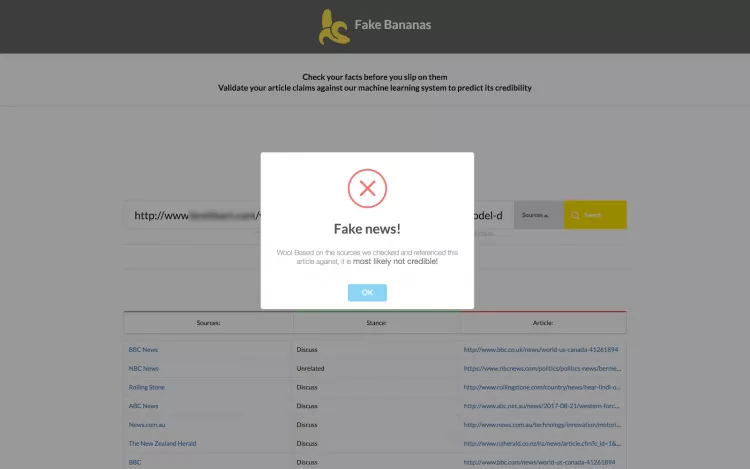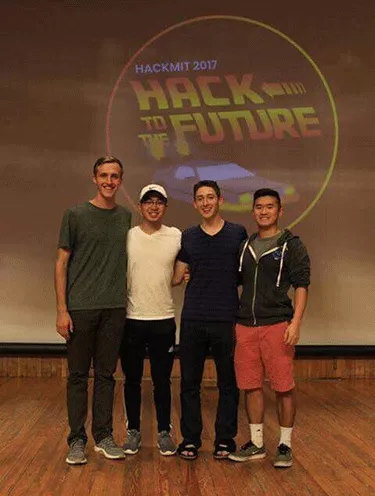Swarthmore Team Places Among Top 10 at Annual Hackathon with Fake News-Detecting App

A screenshot of Fake Bananas after it has rendered a verdict on whether a story is most likely not credible.
Jason Jin ’20, Henry Han ’20, Kastan Day ’20, and Joshua Freier ’20 placed in the top 10 out of roughly 400 teams and 1,250 hackers at HackMIT 2017, an annual student-run hackathon held at MIT last month.
As one of the first 50 teams to complete an admissions puzzle, the team received early admission to the competition. After learning they’d been admitted, the team began brainstorming program ideas over the summer and decided to tackle fake news. During their research, they consulted several Swarthmore professors with experience in machine learning and artificial intelligence.

From left: Kastan Day ’20, Jason Jin ’20, Joshua Freier ’20, and Henry Han ’20.
“We did a lot of brainstorming on an effective way to not only address it but to also present it in an easy-to-use manner for everyone,” explains Jin, of Union City, Calif. “We also created many roadmaps to plan out functionalities we wanted and how we could accomplish them. This topic is a huge research area in computer science right now, and so there were a lot of resources and papers to read.”
The application is based on the concept of stance detection, says Jin. Here's how it works: A user inputs a claim like "Obama was born in Kenya" or a link to an article. The system then searches for related articles through thousands of global and local news sources, including The New York Times and the BBC. It analyzes sources through a machine learning algorithm to determine their stance on the topic or claim. These stances are then run through the system's Reputability Graph; if many reputable sources all agree on the claim, it is most likely accurate. Finally, the system cites its sources so that the reader can learn more.
At the competition, the team of four had 24 hours to create its application, which they named Fake Bananas (a nod to the ridiculous or "bananas" nature of fake news as well as the common practice of Swarthmore computer science lab teams naming themselves after random fruits and vegetables).
“It was definitely quite intense towards the end,” Jin says. “We had barely managed to get the application working by the time judging began, and so when they told us we had made it into the top 10 and ushered us into a private room to demo to panel judges, we were all full of adrenaline. It definitely felt very, very satisfying and exciting when they announced the winners, to know that all our hard work and the very long all-nighter paid off.”
In addition to placing in the top 10, the team won two prizes, one in the category of Most Interesting Use of Data and the other in AI for Developing Countries/Hack for Social Good.
Jin, Han (of Bellingham, Wash), Day (of Seattle, Wash.), and Freier (of Newton Center, Mass.) are all part of LaunchDeck, a club that provides funding for student projects and sponsors events to teach professional development skills.
“Many of the skills you’d utilize at a hackathon and in actual industry are not actually taught in the classroom,” says Jin, adding that he helped found LaunchDeck as a club dedicated to developing personal projects that “would bridge the gap in the areas that are missing from traditional classroom learning, and also provide a community of shared learning so that someone does not need to go through the effort of learning many of the skills needed on their own as they might have to otherwise.”
The team plans to continue to develop Fake Bananas, with the goal of eventually releasing it to the public.



